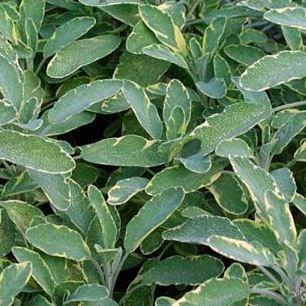
Salvia officinalis 'Icterina' syn. Salvia officinalis 'Variegata'
Garden Sage 'Icterina'
There are many types of Salvia. They can be annual, biennial, or perennial herbs, and woody subshrubs. The leaves are sometimes toothed or pinnately divided. The flowering stems bear small bracts, and in some species the bracts are ornamental. Some Salvias have hairy leaves or stems or flowers, and these hairs sometimes give off an aroma when brushed as oil is secreted. The flowers of Salvia are usually tubular with two "lips" - the lower one larger than the upper one - and often fragrant. Salvia officinalis is a species Salvia and although it is used as a herb, it is botanically an evergreen perennial or sub-shrub. Commonly known as Garden Sage, Common Sage or Culinary Sage, it has aromatic grey-green leaves on somewhat woody stems. In Summer, it produces short spikes of pale blue flowers. 'Icterina' has green leaves with irregular yellow margins, and, occasionally, spikes of purple flowers.
Contributed by @kateb
-
Full sun to partial shade
-
Very little water
-
Frost Hardy: 23F (-5°C)
-
Free draining
Common name
Garden Sage 'Icterina'
Latin name
Salvia officinalis 'Icterina' syn. Salvia officinalis 'Variegata'
type
Evergreen Shrub
family
Lamiaceae
ph
5.0 - 8.5 Acid - Neutral
Plant & bloom calendar
-
Best time to plant
full grown dimensions
 0.60 M
0.75 M
0.60 M
0.75 M
Salvia officinalis 'Icterina' syn. Salvia officinalis 'Variegata'
There are many types of Salvia. They can be annual, biennial, or perennial herbs, and woody subshrubs. The leaves are sometimes toothed or pinnately divided. The flowering stems bear small bracts, and in some species the bracts are ornamental. Some Salvias have hairy leaves or stems or flowers, and these hairs sometimes give off an aroma when brushed as oil is secreted. The flowers of Salvia are usually tubular with two "lips" - the lower one larger than the upper one - and often fragrant. Salvia officinalis is a species Salvia and although it is used as a herb, it is botanically an evergreen perennial or sub-shrub. Commonly known as Garden Sage, Common Sage or Culinary Sage, it has aromatic grey-green leaves on somewhat woody stems. In Summer, it produces short spikes of pale blue flowers. 'Icterina' has green leaves with irregular yellow margins, and, occasionally, spikes of purple flowers.
Planting Outdoors
From Mid Spring TO Late Spring
Plant out container grown plants into partial shade or sunny site that is reasonably sheltered in any ordinary, free draining soil. They do not like to be wet.
Propagation by cuttings
From Mid Spring TO Early Summer
Take soft wood cuttings in spring to early summer. Cleanly cut up to a 10cm long stems, remove lower leaves and pinch the tip out, dip the stem into rooting hormone, fill a container/pot with suitable compost, make holes around the edge of it and plant the cuttings, water in well, cover with a polythene bag and place somewhere warm, lake the bag off twice a week to air the cuttings. Keep the cuttings moist until well rooted. Harden off when well rooted and pot on into individual pots increasing the airing to let the leaves to develop. Remove rotten, dying or dead cuttings regularly.
Propagation by cuttings
From Late Summer TO Mid Autumn
Semi hard wood cuttings are taken from the current years growth from late summer to mid autumn the bottom of the cuttings is hard and soft on the top. With a sharp knife take a cutting of about 14cms, remove lowest leaves, dip end into rooting hormone, and place round the edge of a pot filled with a suitable compost, water well, they must remain moist till rooted, place under glass but in semi shade.















